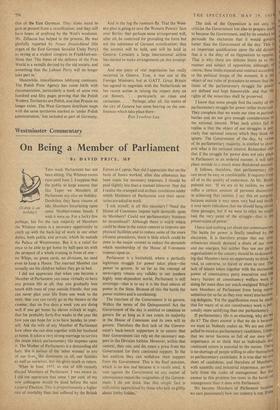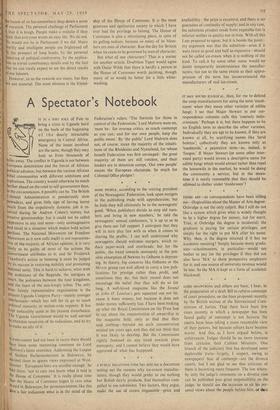Westminster Commentary
On Being a Member of Parliament
By DAVID PRICE, MP
(TAPER is on holiday.)
Tuts week Parliament has not been sitting. The Whitsun recess runs until June 2. I suppose that the public at large assume that like Taper we Members of Parliament are also on holiday. Doubtless they have visions of idle Members luxuriating upon some Mediterranean beach. wish it were so. For a lucky few perhaps, but for the vast majority of Members the Whitsun recess is a necessary opportunity to catch up with the back-lag of work in our other duties, both public and private, which lie outside the Palace of Westminster. But ills a relief for once to be able to get home by half-past six with the prospect of a whole evening in front of one— no Whips, no green cards, no divisions, no need even to keep a House. The married Member can actually see his children before they go to bed.
I did not appreciate that when you become a Member of Parliament you cease virtually to have any private life at all; that you gradually lose touch with most of your outside friends; that you can never plan your life from one week to the next; that you can rarely go to the theatre or the cinema; that on five days a week you are doing well if you get home by eleven o'clock at night; that for probably forty-five weeks in the year the best you can hope for is to have Sunday to your- self. Ask the wife of any Member of Parliament how often she can dine together with her husband at home. It takes a very strong marriage to survive the strain which parliamentary life imposes upon it. The Mother of Parliaments is a demanding old lady. She is jealous of the 'other woman' in any of our lives., She dominates us all, our families as well- as ourselves, hut she gives much in return.
When in June. 1955. as one of 630 recently elected Members of Parliament. I was sworn in, I did not appreciate that some 5 per cent, of my new colleagues would be dead before the next General Election. This is proportionately a higher rate of mortality than that suffered by the British Forces in Cyprus. Nor did I appreciate that on the basis of hours worked, after due allowance has been made for necessary expenses, I should be paid slightly less than a manual labourer. Nor did I realise the cramped and archaic conditions under which Members of Parliament and their secre- taries are asked to work.
I ask myself, is all this necessary? Need the House of Commons impose such demands upon its Members? Could not parliamentary business be streamlined? Although there is much which could be done in the minor context to improve our physical facilities and to reduce some of the more irksome procedures, there is little which could be done in the major context to reduce the demands which membership of the House of Commons imposes upon us.
Parliament is a battlefield, where a perfectly legitimate struggle for power takes place—the power to govern. In so far as the concept of sovereignty retains any validity in our modern highly inter-dependent world, Parliament is still sovereign—that is to say it is the final source of power in the State. Because of this the battle for power matters and is unrelenting.
The function of the Government is to govern. Within the terms of the Quinquennial Act the Government of the day is entitled to continue to govern for as long as it can retain its majority in the House of Commons and its own will to govern. Therefore the first task of the Govern- ment's back-bench supporters is to ensure that their Government can rely on the necessary sup- port in the Division lobbies. However, within that context, they can, and do, exact a price from the Government for their continued support. In the last analysis they can withdraw their support from the Government. This is the final sanction, which is no less real because it is rarely used. A vote against the Government 'on any matter of consequence means the resignation of the Govern- ment. I do not think that this simple fact is sufficiently appreciated by those who talk so glibly about 'lobby fodder.' The task of the Opposition is not only to criticise the Government but also to prepare itself to become the Government, and by its conduct to persuade the electorate that it would govern better than the Government of the day. This is an important qualification upon the old dictum that it is the duty of an Opposition to oppose. That is why there are definite limits as to the manner and subject of opposition, although. of course, these limits expand and contract according to the political tempo of the moment. It is the object of our rules of procedure to ensure that the limits of the parliamentary struggle for power are defined and kept honourable, and that the rights of the minorities shall be preserved.
I know that some people find the reality of the parliamentary struggle for power rather irrelevant.. They complain that we waste our time in partisan battles and do not give enough consideration to the national interest. What such critics fail to realise is that the object of our struggles is pre- cisely that national interest which they think We ignore. The Government of the day, by virtue of its parliamentary majority, is entitled to inter- pret what is the national interest. Remember also that if the struggle for power does not take place in Parliament in an ordered manner, it will take place outside in a much more disordered manner.
It follows, therefore, that parliamentary life can never be easy or comfortable. It requires troll) all of us the quality of endurance. As Mr. Butler pointed out : 'If we are to be realists, we must suffer a certain amount of personal discomfort in achieving that realism. I say this on purpose. because outside it may seem very bad and inside it may seem ridiculous that we should hang abat these passages, but if we were to relax we might lose the very point of the struggle—that is the preservation of power.'
I have said nothing yet about our constituencies. The battle for power is finally resolved by the electorate. It is therefore proper that our con. stituencies should demand a share of our time and our energies, but neither they nor our partY organisations in the country should be so demand- ing that Members have no opportunity to think, to read, to converse, to travel or even to rest. The Jack of leisure taken together with the increasing power of constituency party executives and the heavy burden of constituency welfare work is doing far more than our much-maligned Whips tc turn Members of Parliament from being repre" sentatives (in so far as they ever were) into becom- ing delegates. Yet the qoalification must be made that for many of us our constituency work is per' sonally more satisfying than our parliamentary. If parliamentary life is so exacting, why do We do it? The short answer is that we do it because we want to. Nobody makes us. We are not com- pelled to stand as parliamentary candidates. I hope that we never become so full of our own self- importance as to think that as individuals our continued return is essential to the nation. There is no shortage of people willing to offer themselves as parliamentary candidates. It is true that we arc short of candidates, and therefore of Members, with scientific and industrial experience, particu- larly from the ranks of management. But the answer to this problem lies more in the hands of management than it does with Parliament.
We become Members of Parliament because we care passionately how our country is run. Eve" the basest of us has somewhere deep down a sense of vocation. The personal challenge of Parliament is that it is tough. People make a mistake if they think that everyone.wants an easy life. We do not. \Ve would not be in Parliament if we did. Many worthy and intelligent people are frightened off bY the prospect of long hours, by the personal battering of political controversy, by the applica- tion to trivial constituency details and by the fact that we can rarely expect to see the direct results of our labours.
However, to us the rewards are many, but they are not material. The most obvious is the friend- ship of the House of Commons. It is the most generous and egalitarian society to which I have ever had the privilege to belong. The House of Commons is also a stimulating place, in spite of its galling tedium, because so many of its Mem- bers are men of character. Rue the day for Britain when we cease to be governed by men of character.
But what of our characters? That is a matter for another article. Doubtless Taper would agree with Oscar Wilde that there is hardly a person in the House of Commons worth painting, though many of us would be better for a little white- washing.















































 Previous page
Previous page